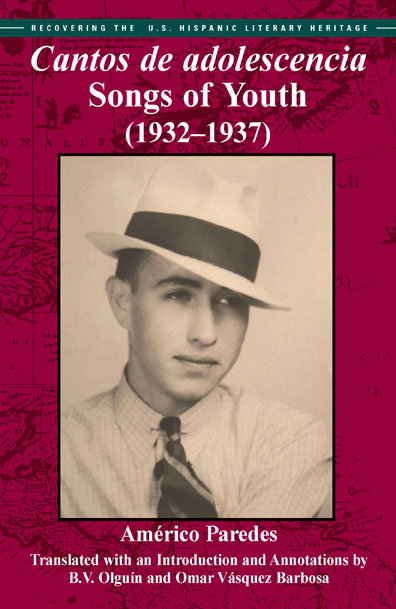Cantos de adolescencia: Songs of Youth (1932-1937)
$16.95
by Américo Paredes
Translated by Omar Vásquez Barbosa and B.V. Olguín
ISBN: 978-1-55885-495-6
Publication Date: September 30, 2007
Bind: Trade Paperback
Pages: 304
Contains a literary chronology of Paredes’ work, plus correspondence, photos, and other materials from the Américo Paredes Papers at the Archival Collections of the Nettie Lee Benson Latin American Collection at the University of Texas at Austin.
Available
“Stop, Time, your fast race; / turn back to my lost infancy.” With the final poem of this collection, “Upon Turning Twenty One,” famed Chicano folklorist Américo Paredes closes a chapter in his life—one written during his formative years from 1932 to 1937—as he grew from a seventeen-year-old boy to a twenty-one-year-old man. In doing so, the renowned writer looks “toward the unknown future maze.”
Originally published in 1937 by Librería Española in San Antonio, Texas, this new edition contains the first-ever English translations of the original Spanish poems and an introduction by the translators, scholars and poets in their own right, B.V. Olguín and Omar Vásquez Barbosa.
Paredes, who died in 1999 at the age of 84, is widely considered to have been at the forefront of the movement that saw the birth of Chicana/o literary and cultural studies as an academic discipline in the 1970s and 1980s. This collection of poetry written during his teenage years lays the groundwork for themes he explored in later writings: culture conflict, race relations, gender relations, materialism, hybridity, and transnationalism. In his youthful, first-person voice, Paredes explores intimate, angst-filled issues relevant to all young people, such as love, memory, and rebellion.
Published as part of the Recovering the U.S. Hispanic Literary Heritage Project Series, this vital volume is a must read for Paredes scholars and those interested in the dynamic intersection of cultures in the 1930s. It contains a literary chronology of Paredes’ literary development and includes correspondence, photos, and other materials from the Américo Paredes Papers at the Archival Collections of the Nettie Lee Benson Latin American Collection at the University of Texas at Austin.
2008 International Latino Book Award Winner for Best Poetry Book-Spanish
“It’s not necessary to read more than a few of [Paredes’] poems to realize that he was born with a perfect ear. In formal verse forms, his rhythms are impeccable…his unrhymed verse has its own structure—a cadence that faithfully reproduces the natural movements of spoken language. The translators deserve praise for the notes following the poems…”—ForeWord Magazine
“Translated into English for the first time, this volume will be of interest to Paredes scholars…annotated notes at the end of the volume are impressive and necessary, explaining choices about retaining rhyme and rhythm so essential to the poems and providing background information.”—Críticas
“With an extensive introduction, facsimiles from the Américo Paredes Papers, and poetry covering Mexican patriotism, music, nature, comedy; tragedy of love, décimas, and l’envoi, Canto/Songs is highly recommended for the general adolescent to adult reader, as well as to both undergraduate and graduate students for its scholarly interest.”—REFORMA Newsletter
AMÉRICO PAREDES (1915-1999) is the author of numerous works, including With a Pistol in His Hand: A Border Ballad and Its Hero (University of Texas Press, 1970), the novel George Washington Gómez (Arte Público Press, 1990), and a collection of poetry, Between Two Worlds (Arte Público Press, 1990).
B.V. OLGUÍN, a poet and associate professor of Literature and Creative Writing at the University of Texas at San Antonio, is the author of numerous articles on Latino literature. His book, La Pinta: History, Culture and Ideology in Chicano Convict Discourse (2008), was published by the University of Texas Press.
Learn more by visiting his faculty page.
OMAR VÁSQUEZ BARBOSA, a native of Mexico, currently lives in Barcelona, Spain, where he works as a writer and translator and recently finished a Master of Arts in Film Making. He obtained his first master’s degree from the University of Texas at San Antonio.









